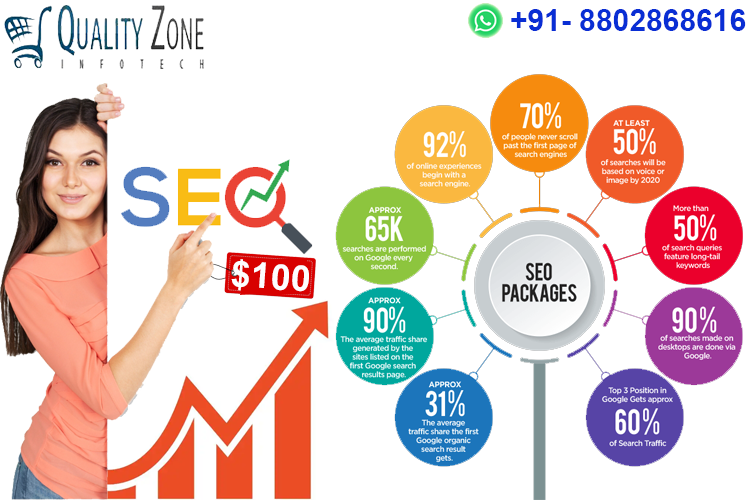What Are The Basic Tips & Steps On Which Every SEO Has To Follow In Ecommerce Website Development Company ??
Simple and easy 7+ STEPS where SEO can Improve are :
Step1: Make a Google My Business Account. ...
Step2: Get Regular Reviews from Happy Customers. ...
Step3: Enhance for Voice Search. ...
Step4: Make Content Based on Local News Stories or Events. ...
Step5: enhance Your Website for Mobile. ...
Step6: Focus on Local Keywords. ...
Step7: Use Location Pages or a Location-Specific "About Us" Page. ...
Step8: Exploit Online Business Directories.
All the above steps should go through by each SEO for making good heads to become the Best eCommerce website development Delhi and various regions which will help the company to achieve great success.
eCommerce website development cost in Delhi
eCommerce website development company in Delhi
eCommerce development company in Delhi
Best eCommerce website development Delhi
eCommerce development company in Noida
Best eCommerce website development company in Delhi
eCommerce development company in Delhi
eCommerce website development company in Noida
eCommerce web development company in Noida
eCommerce website development company in Noida
1 Answer
The requirement for a successful eCommerce Search Engine Optimisation strategy is unavoidable, as online eCommerce stores compete fiercely to rank higher in commercial search results in order to generate more organic free traffic to the online store of potential customers who complete at least one purchase transaction. a strong desire to do
Search Engine Optimization (SEO) is a long term uphill battle that requires continual improvement for your eCommerce website by following optimized strategy guidelines to reach the first position for desired search results and eCommerce SEO is a more uphill battle. Because they are hundreds or maybe thousands of stores competing for the same keywords related to products or product categories because the expected return is higher than the expected return for any other type of website.
Ranking in the first search results for targeted business search queries is the result of a detailed eCommerce SEO strategy and the execution of defined steps and appropriately efficient techniques to capitalise on the benefits of professional search engine optimization processes.
The main steps to an efficient eCommerce SEO strategy are:
#1. eCommerce keyword research
Ecommerce Keyword research is more technical and important than keyword research and the selection process for other types of websites, as your main objective is to choose the appropriate keywords for transactional search that are appropriate for potential customers to meet their needs. Products are used to find and eventually buy. They appear in search results before e-commerce stores and provide an exceptional online shopping experience.
Keyword research is critical to your eCommerce SEO strategy because the targeted keywords will be included in the content for product and category pages, website structure "categories – sections – URLs," and your eCommerce blog to ensure effective targeting for the desired Stuff. Results of a search.
Using reliable keyword research tools, the selection of appropriate keywords should be based on:
Acceptable monthly search volume for your industry
The competition level for target keywords
Relevance to available products and categories
Cost per click estimate "the higher you go, the better"
#2. Improving eCommerce website structure
User experience is an important ranking factor for search engines as they aim to guarantee the best navigation experience for search engine users by only displaying websites that care about that aspect to reduce the bounce rate of online store visits.
Optimizing your eCommerce website structure for search engines and users is imperative to your overall eCommerce SEO efficiency as you will be able to:
Search engines to access, index and fetch products and category pages for related search queries
Potential customers to reach desired pages with “3 or less” few clicks by optimizing “online store visitors” structure, providing suggestions for related or product pages and efficient search bar
Distributing or passing domain authority and adding juice efficiently to categories and product pages from the home page
#3. On-page SEO for product and category pages
On-page SEO is a critical factor in reaching higher rankings in targeted search results for your eCommerce store, increasing clicks on your website search results "CTR", increasing more conversions and sales, and the overall success of your eCommerce search engine optimisation plan.
On-page search engine optimisation is all about optimizing your e-commerce website content to comply with search engine standards and encourage potential customers to complete the desired tasks:
Using chosen keywords to optimize titles, meta descriptions, URLs, titles, alt text of images and video transcripts
Using verbs and sales modifiers such as "Buy / Cheap / Best / Deals / Sale / Free Shipping" for product pages' titles and meta descriptions
Creating a detailed profit-focused copy for each product page
Leveraging visual content by uploading high-quality professional product photos, promotional videos for products and informational videos on how to use
Displaying customer reviews to build trust
Linking internal related product or category pages
Using the "Snippets" Schema for Product Reviews to Influence Search Engine Users
Increasing the value of your e-commerce blog to potential and current customers through related tips and insights
Including Social Media Share Buttons
#4. Handling Ecommerce Technical SEO Issues
Ecommerce websites are known to have a growing number of pages for products and categories and with more pages available, there will be more technical SEO aspects and issues to take care of.
The efficient eCommerce SEO process requires periodic site audits "weekly or twice a month" to uncover and handle technical SEO issues to avoid losing the high rankings achieved on search results or providing a poor user experience
Issues with mobile optimization relating to responsive design and navigation experience
Existing duplicate content, thin content ("pages with less than acceptable content"), and broken links are all possibilities.
Product, category, and update pages that are not indexable
Concerns about the database and financial transaction security
The speed with which a website loads on various devices ("Desktop / Mobile / Tablet")
Existence of valid updated sitemap and robots.txt
Event of multiple redirects and "404" page not found
#5. eCommerce link building
Ecommerce link building is a difficult challenge because many websites or blogs are not ready to reference a website that contains products rather than valuable related content.
Despite how challenging it is, link building is essential to your eCommerce SEO strategy as it increases and displays your eCommerce website authority to search engines to improve ranking in targeted search results and earn referral traffic. Is.
An effective eCommerce link building strategy will require a detailed analysis of your backlinks profile and competitors' backlinks profiles to define eligible link building opportunities and your outreach plan.







